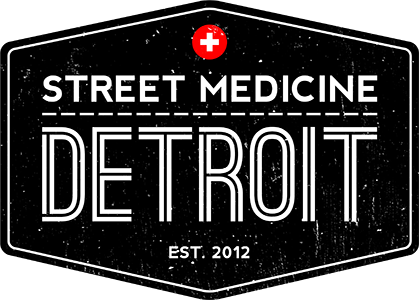Homelessness puts individuals at greater risk of certain health issues. Since individuals experiencing homelessness are not sheltered from the elements and may not have reliable access to nutritious food and fresh running water, some conditions are more likely to develop. The lack of safe and comfortable bedding, seating, and shelter also puts individuals at greater risk for injuries. On top of this, limited access to health insurance, makes caring for this population more difficult, as well.
While every individual experiencing homelessness is different, here at Street Medicine Detroit we know it’s important to understand important issues that disproportionately impact our population. This information helps us approach patients with compassion and screen for high risk conditions. Here we’ve listed six of the most common concerns we encounter when on a street run.
Mental Health and Substance Use Disorders
A large portion of the homeless population suffers from mental health conditions. In many cases, individuals become homeless after being released from hospitals or jails without any support or assistance for mental health conditions. Substance abuse among the homeless is a multi-faceted problem. Some individuals become homeless after battling with substance abuse issues, while others develop substance use disorders as a way to cope with chronic pain or the stress of homelessness.
Infectious Diseases
Poor nutrition and compromised immune systems, as well as exposure to many people every day, put individuals experiencing homeless at risk of contracting infectious diseases. Activities more common among the homeless population, such as intravenous drug use and unprotected sex also put these individuals at greater risk for certain illnesses and conditions. Without access to antibiotics or a sterile environment for recovery, these diseases also worsen quicker than in a traditional patient.
Skin and Foot Conditions
Showering and moisturizing the skin regularly is difficult for those without homes; this makes individuals experiencing homeless more susceptible to develop skin conditions. In addition, walking many miles on a typical day, often in worn shoes, puts the homeless population at greater risk for developing foot problems. Furthermore, exposure to moisture in wet seasons intensifies these skin and foot complications.
Dental Problems
Many individuals experiencing homelessness do not have access to running water and dental hygiene supplies, such as toothbrushes, toothpaste, and floss. This makes regular tooth care difficult, so tooth decay and gum disease are common among homeless. Inadequate access to proper nutrition also has a negative impact on dental health.
Assault and Violence
Individuals experiencing homelessness are often targets of violence. Without shelter to protect against crimes of violence, this population is vulnerable than an individual with housing. Men are much more likely to be attacked and women are often subjected to sexual assault. Lack of health insurance and financial resources also makes these attacks more likely to go untreated and develop into an infection or disability.
Unintentional Injuries
Individuals experiencing homelessness are more often struck by motor vehicles and suffer falls that go untreated more frequently than individuals with homes. Individuals may also suffer burns while trying to stay warm or become injured due to extreme conditions. Severe sunburn or frostbite is more likely to occur because homeless people have limited ways to shield themselves from the elements.
Street Medicine Detroit helps combat some of the health concerns disproportionately impacting the homeless population in the city. After receiving treatment and connecting with primary care physicians, patients have improved quality of life and are better prepared to focus on housing and employment.
Amanda Flowers draws on her studies in Psychology, English Literature, and Public Health to create online content that addresses human needs in a simple way. Flowers is currently a freelance health blogger and writer for Blue Cross Blue Shield of North Carolina.

